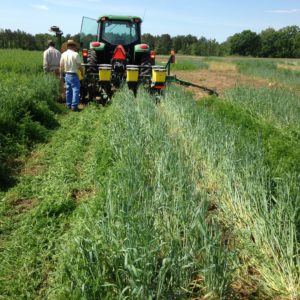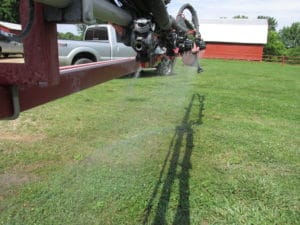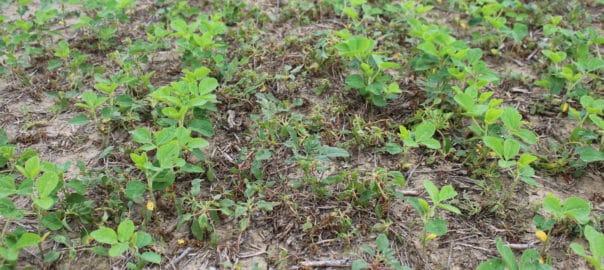The worst kept secret in West Tennessee has been the reports of poor Palmer amaranth control with Engenia in a field in Fayette County. Continue reading
Category Archives: Soybean
Moth Trapping Data
This is a reminder that moth trapping data for corn earworm (bollworm), tobacco budworm, and southwestern corn borer will be posted weekly during the summer. You can open the Excel file under the Quick Link menu on the left or directly at this link – http://www.utcrops.com/BlogStuff/2017MothTrappingData.xls. A few southwestern corn borers were caught this week, indicating the first generation is starting, perhaps just a little earlier than usual. Generally low numbers of corn earworm and tobacco budworm moths were also caught last week.
Recent Midsouth Studies Show Dicamba not Very Effective on some Populations of Glyphosate/PPO-Resistant Palmer Amaranth.
Last summer Dr. Tom Barber, University of Arkansas weed scientist, invited me to visit his field research on glyphosate/PPO-resistant Palmer amaranth in Crittenden County, Arkansas. As was expected glyphosate and Flexstar provided very poor Palmer amaranth control in his tests.
What was not expected is that a number of other herbicides provided poor control as well. Even dicamba at 0.5 lbs/A (Clarity 16 oz) on small Palmer amaranth provided less than optimal control. Continue reading
Tennnessee Variety Test Program Survey
Things have been busy this past month in the Tennessee variety test program as entries continue to roll in for our 2017 corn and soybean tests. This year we will be testing a total of 86 corn grain hybrids, 11 corn silage hybrids, and 195 soybean varieties across the state of Tennessee.
We know the variety test program is important to many of you. In order to make sure this program continues to meet your needs, we’d like some feedback from you!
If you are a Tennessee corn, soybean, wheat, or cotton producer, please take a few minutes to help us out by taking this survey. Producer – Variety Test Survey
If you are not a producer, but you provide folks with advice on variety selection (scout, retailer, seed company rep), then please take this survey. Industry – Variety Test Survey
Thanks for your help as we continue to figure out ways we can better serve you through our Tennessee variety test program!
Weed Control with your Cover Crop
 With planting just around the corner, there are a few management considerations of cover crops that are being used for weed control. There is no single best way to manage all cover crops prior to any given cash crop. Tailoring the cover crop to best fit your cash crop can make a difference in the ultimate success of your weed control program. Continue reading
With planting just around the corner, there are a few management considerations of cover crops that are being used for weed control. There is no single best way to manage all cover crops prior to any given cash crop. Tailoring the cover crop to best fit your cash crop can make a difference in the ultimate success of your weed control program. Continue reading
New Nozzles with the New Technology
 With the Xtend technology now available, hopefully everybody is gearing up with the correct nozzles and application knowledge needed to be successful. Although there are other application requirements in place with the new Xtendimax™ (www.xtendimaxapplicationrequirements.com) and Engenia™ (www.engeniatankmix.com) herbicide labels, the single most important thing you can do to steward this technology is equip your sprayer with the correct nozzles. Continue reading
With the Xtend technology now available, hopefully everybody is gearing up with the correct nozzles and application knowledge needed to be successful. Although there are other application requirements in place with the new Xtendimax™ (www.xtendimaxapplicationrequirements.com) and Engenia™ (www.engeniatankmix.com) herbicide labels, the single most important thing you can do to steward this technology is equip your sprayer with the correct nozzles. Continue reading
Where did the Horseweed go?
Where is the horseweed (marestail)? That has been a common question this March. I have no data to say exactly but I can speculate. My thought is that the main event that has limited its germination was the very dry fall and indeed winter of 2016 and 2017. Continue reading
Pest Management and Cover Crops
There is growing discussion and interest in the use of cover crops, mostly commonly in soybean but also in corn and cotton. Some of the benefits seem pretty intuitive and include improved control of erosion and the buildup of organic matter. Another obvious benefit is NRCS programs which pay growers to plant specified cover crops. Dr. Larry Steckel and his students have also shown benefits of cover crops in reducing the emergence of Palmer pigweed and some other weeds. However, having said all that, there are some concerns and unknowns about how cover crops might affect populations of soil and seedling pests. Continue reading


